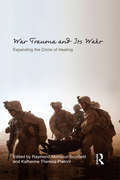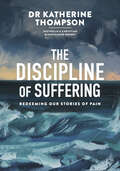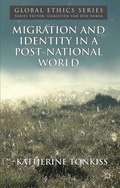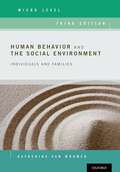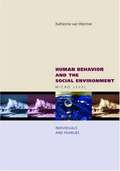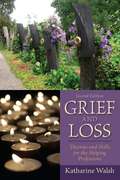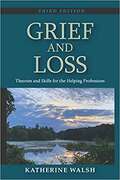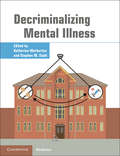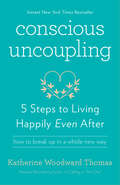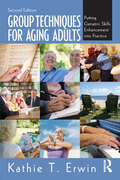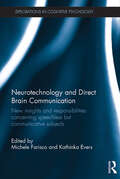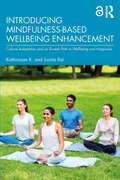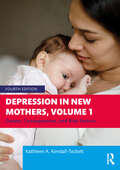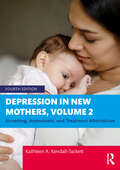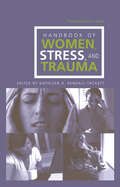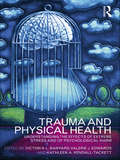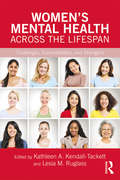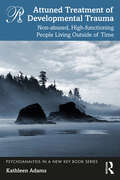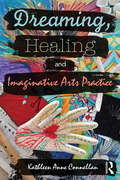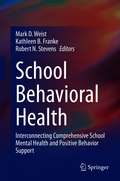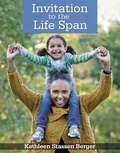- Table View
- List View
War Trauma and Its Wake: Expanding the Circle of Healing (Psychosocial Stress Series)
by Raymond Monsour Scurfield Katherine Theresa PlatoniDecades after Charles Figley’s landmark Trauma and Its Wake was published, our understanding of trauma has grown and deepened, but we still face considerable challenges when treating trauma survivors. This is especially the case for professionals who work with veterans and active-duty military personnel. War Trauma and Its Wake, then, is a vital book. The editors—one a Vietnam veteran who wrote the overview chapter on treatment for Trauma and Its Wake, the other an Army Reserve psychologist with four deployments—have produced a book that addresses both the specific needs of particular warrior communities as well as wider issues such as battlemind, guilt, suicide, and much, much more. The editors’ and contributors’ deep understanding of the issues that warriors face makes War Trauma and Its Wake a crucial book for understanding the military experience, and the lessons contained in its pages are essential for anyone committed to healing war trauma.
The Discipline of Suffering: Redeeming Our Stories of Pain
by Katherine ThompsonFrom the author of the bestseller Christ-Centred Mindfulness, a transformative book that tackles the faulty stories we tell ourselves during times of pain and suffering.Katherine Thompson shows how suffering can be a spiritual discipline, fostering growth, healing and a deeper faith in God. Her book provides a safe space to explore the difficult questions raised by suffering while encouraging us to confront personal challenges rather than avoid them.The Discipline of Suffering offers practical strategies, real-life stories and useful skills to help reconstruct broken lives, equipping readers to navigate through difficult times.Whether you seek healing, resilience or a renewed sense of purpose, The Discipline of Suffering is your guide to redeeming your story and finding meaning amidst adversity.
Migration and Identity in a Post-National World
by Katherine TonkissKatherine Tonkiss offers a succinct account of constitutional patriotism theory, specifically arguing that it involves a commitment to free migration. She draws on qualitative research to explore the implications of this claim for the dynamics of post-national identity and belonging in local communities.
The Psychology of Extremism
by Katherine V. AumerThis volume examines the psychological factors, environments, and social factors contributing to identification with extremist identities and ideologies. Incorporating recent findings on interpersonal relationships, emotions, and social identity, the book aims to improve understanding of what makes individuals vulnerable to extremism. It concludes with a discussion of the intricacies of identification with extremist groups, a proposal for de-radicalization, and a call for awareness as a means to resist polarization. Chapters highlight interdisciplinary research into specific concepts and behaviors that can lead to extremism, addressing topics such as:● Homogamy, tribalism and the desire to belong● Shared hatred in strong group identities● The impact of emotional contagion on personal relationships● Dehumanization across political party linesAn in-depth exploration of an increasingly divisive modern issue, The Psychology of Extremism is an essential resource for researchers and students across social psychology, sociology, political psychology, and political science.
Human Behavior and the Social Environment, Micro Level: Individuals and Families
by Katherine Van WormerHuman Behavior and the Social Environment, Micro Level draws on a resilience model to explore the dynamics of human behavior across the life span. Biological, psychological, and spiritual dimensions are covered. Illustrations and vignettes from social work, psychology, literature, philosophy, and current events highlight the turning points in our lives. Critical thinking questions are provided. The result is an essential book that bridges theory and practice in accordance with the 2015 Council on Social Work Education (CSWE) standards.
Human Behavior and the Social Environment: Micro Level: Individuals and Families
by Katherine Van WormerIn a fresh, elegant, and accessible manner, Human Behavior and the Social Environment, Micro Level explores the nuances of the biological, psychological, cultural, and spiritual dimensions of our social lives. Drawing on examples from social work, psychology, literature, philosophy, and current events, it richly illustrates human development and behavior, both normal and abnormal. <P><P>Katherine van Wormer skillfully integrates recent research ranging from brain imaging to international surveys on happiness, lending extraordinary insight into our drives and motivations. The result is a singular textbook that truly bridges theory and practice by revealing the patterns and paradoxes of our behavior in the social context.
Grief and Loss: Theories and Skills for the Helping Professions
by Katherine WalshGrief and Loss: Theories and Skills for the Helping Professions, 2/e, allows readers to see how essential theories and skills will enhance their own practice. They will gain the core knowledge and skills needed to work with individuals, families, groups, and communities who are experiencing loss and the grief that accompanies it. <p><p> Culture, spirituality, age, gender and other factors that influence grief reactions are discussed, helping readers understand and work with diverse populations. Individual and programmatic responses to grieving people are also included. Each chapter contains exercises that encourage readers to apply the concepts learned and MySocialWorkLab includes a variety of Internet resources and supplemental learning tools.
Grief and Loss: Theories and Skills for the Helping Professions
by Katherine WalshLoss is a part of every life, and grief related to loss is inescapable. It can result in distress that impacts work, learning, rehabilitation, spiritual beliefs, social relationships, health, mental health, and well-being. Helping professionals who encounter grief reactions in multiple settings are often not trained to identify and respond to the many complex grief-related problems of clients. Without the opportunity to learn how to assess and address grief, many may lack confidence in acknowledging loss and providing effective support. Although grieving is an extremely painful part of life, integration and adjustment are possible, and meaning can be made from loss. Readers will find many examples from caring and resilient students, interdisciplinary professionals, teachers, clients, and family members who have learned to make meaning from loss. The content of the third edition has been significantly influenced by the COVID-19 pandemic, the opioid addiction crisis, and increased awareness of racial trauma and injustice. The book provides a foundation for understanding, assessing, and responding effectively to grief and loss. The content is designed for students and professionals who find themselves working in proximity to loss, trauma, and grief in various capacities—educator, advocate, case manager, counselor, mental health and health care provider, and more. The work is vitally important, and the rewards for helping others cope with grief and loss are substantial.
Decriminalizing Mental Illness
by Stephen M. Stahl Katherine WarburtonReports reveal an increase in the number of individuals with serious mental illness in jails, prisons and forensic hospitals. Despite the wide-ranging and devastating consequences of this 'criminalization' of mental illness, there remains a lack of information on the subject as well as on the provision of care for these patients. This important new book fills a gap in the literature by examining topics such as: the history and policy factors related to criminalization; original research on forensic populations; pharmacological and psychological treatment strategies; and principles and guidelines for diversion out of the criminal justice system. Contributions from leading experts in the field further our understanding of this important subject, offering advice on how to provide humane care for patients. A must have for all mental health clinicians including psychiatrists, psychologists, social workers, rehabilitation therapists, and mental health nurses. A useful tool for mental health administrators and policy makers.
Heidegger on Being Uncanny
by Katherine WithyThere are bizarre moments when we feel like strangers to ourselves. Through an investigation of Heidegger's concept of uncanniness, Katherine Withy explores what such experiences reveal. She shows that we can be what we are only if we do not fully understand what it is to be us, and points toward what it is to live well as an uncanny human being.
Conscious Uncoupling: 5 Steps to Living Happily Even After
by Katherine Woodward ThomasAnd Then They Lived Happily... We enter our romantic relationships with great love, hope, and excitement--we've found the 'one', so we plan and forge our futures together. But sometimes, for many different reasons, relationships come undone; they don't work out. Commonly, we view this as a personal failure, rather than an opportunity. And instead of honoring what we once meant to each other, we hoard bitterness and anger, stewing in shame and resentment. Sometimes even lashing out in destructive and hurtful ways, despite the fact that we're good people at heart. That's natural: we're almost biologically primed to respond this way. Yet there is another path to the end of a relationship--one filled with mutual respect, kindness, and deep caring. Katherine Woodward Thomas's groundbreaking method, Conscious Uncoupling, provides the valuable skills and tools for you to travel this challenging terrain with these five thoughtful and thought-provoking steps: Step 1: Find Emotional FreedomStep 2: Reclaim Your Power and Your LifeStep 3: Break the Pattern, Heal Your HeartStep 4: Become a Love AlchemistStep 5: Create Your Happy Even After Life This paradigm-shifting guide will steer you away from a bitter end and toward a new life that's empowered and flourishing.From the Hardcover edition.
Group Techniques for Aging Adults: Putting Geriatric Skills Enhancement into Practice
by Kathie T. ErwinElders can struggle with issues of social isolation and self-esteem, and benefit from having positive coping skills at their disposal. The practical ideas Kathie Erwin imparts in this second edition help mental health professionals working with elderly populations to create an interactive, multi-modal program that addresses the issues and needs elders have. The group modalities are defined in holistic contexts of mind, body, society, and spirituality. Among the group modalities are reminiscence, bibliotherapy, remotivation, humor, expressive art, and therapeutic writing and sacred spaces, which are new to this edition. Mental health professionals appreciate the practical and detailed guidelines for how to design, implement, and monitor progress for various types of group modalities that allow them to put theory into practice easily. Their elder clients will benefit from the methods they develop in group to deal with problems such as isolation and reduced social networks.
Neurotechnology and Direct Brain Communication: New insights and responsibilities concerning speechless but communicative subjects (Explorations in Cognitive Psychology)
by Michele Farisco Kathinka EversNeurotechnology and Direct Brain Communication focuses on recent neuroscientific investigations of infant brains and of patients with disorders of consciousness (DOC), both of which are at the forefront of contemporary neuroscience. The prospective use of neurotechnology to access mental states in these subjects, including neuroimaging, brain simulation, and brain computer interfaces, offers new opportunities for clinicians and researchers, but has also received specific attention from philosophical, scientific, ethical, and legal points of view. This book offers the first systematic assessment of these issues, investigating the tools neurotechnology offers to care for verbally non-communicative subjects and suggesting a multidisciplinary approach to the ethical and legal implications of ordinary and experimental practices. The book is divided into three parts: the first and second focus on the scientific and clinical implications of neurological tools for DOC patient and infant care. With reference to these developments, the third and final part presents the case for re-evaluating classical ethical and legal concepts, such as authority, informed consent, and privacy. Neurotechnology and Direct Brain Communication will appeal to researchers and postgraduate students in the fields of cognitive science, medical ethics, medical technology, and the philosophy of the mind. With implications for patient care, it will also be a useful resource for clinicians, medical centres, and health practitioners.
Introducing Mindfulness-Based Wellbeing Enhancement: Cultural Adaptation and an 8-week Path to Wellbeing and Happiness
by Kathirasan K. Sunita RaiMindfulness-Based Wellbeing Enhancement (MBWE) integrates Mindfulness and Wellbeing to realize human flourishing and the attainment of happiness. This 9-session program, conducted over 8 weeks, enhances wellbeing, happiness and quality of life through self-understanding and self-awareness. The first part of the book is devoted to presenting mindfulness, wellbeing, the happiness paradigm and the curriculum of the Mindfulness-Based Wellbeing Enhancement (MBWE) program. It presents the foundations of mindfulness-based programs, and how mindfulness intersects with wellbeing. The authors argue, with the support of evidence, that mindfulness is well placed to promote human flourishing rather than limiting its relevance to stress reduction and preventing depression relapse. Several chapters are devoted to presenting the MBWE program comprehensively with weekly agendas, homework, handouts, facilitation guides and practice scripts. The second part of the book presents the evidence base of mindfulness, cultural adaptations for different populations, the therapeutic effectiveness of group learning inherent in Mindfulness-Based Programs and the often-untold history of mindfulness. The authors present the often-neglected Asian roots of Mindfulness and justify how secular Mindfulness, as taught by Jon Kabat-Zinn, is influenced by multiple wisdom traditions as opposed to it being a solely Buddhist practice. This book serves as a hands-on resource for trained mindfulness teachers, psychologists, psychiatrists, psychotherapists, counsellors, social workers, practitioners, educators, coaches, and consultants. It is also suitable for anyone who is interested in the appreciation of mindfulness and human flourishing.
Introducing Mindfulness-Based Wellbeing Enhancement: Cultural Adaptation and an 8-week Path to Wellbeing and Happiness
by Kathirasan K. Sunita RaiMindfulness-Based Wellbeing Enhancement (MBWE) integrates Mindfulness and Wellbeing to realize human flourishing and the attainment of happiness. This 9-session program, conducted over 8 weeks, enhances wellbeing, happiness and quality of life through self-understanding and self-awareness.The first part of the book is devoted to presenting mindfulness, wellbeing, the happiness paradigm and the curriculum of the Mindfulness-Based Wellbeing Enhancement (MBWE) program. It presents the foundations of mindfulness-based programs, and how mindfulness intersects with wellbeing. The authors argue, with the support of evidence, that mindfulness is well placed to promote human flourishing rather than limiting its relevance to stress reduction and preventing depression relapse. Several chapters are devoted to presenting the MBWE program comprehensively with weekly agendas, homework, handouts, facilitation guides and practice scripts.The second part of the book presents the evidence base of mindfulness, cultural adaptations for different populations, the therapeutic effectiveness of group learning inherent in Mindfulness-Based Programs and the often-untold history of mindfulness. The authors present the often-neglected Asian roots of Mindfulness and justify how secular Mindfulness, as taught by Jon Kabat-Zinn, is influenced by multiple wisdom traditions as opposed to it being a solely Buddhist practice.This book serves as a hands-on resource for trained mindfulness teachers, psychologists, psychiatrists, psychotherapists, counsellors, social workers, practitioners, educators, coaches, and consultants. It is also suitable for anyone who is interested in the appreciation of mindfulness and human flourishing.
Hug Therapy Book
by Kathleen A. KeatingFrom the Publisher: Relax, raise your arms, place them around the person in front of you and squeeze gently. But, no bear hugs, please. Kathleen Keating and Mimi Noland combine their talents to show how and why all kinds of hugs have positive results on IQ, aging, self-esteem, and stress. Simple line art drawings of charismatic cartoon bears lend a whimsical touch to book guaranteed to touch your heart. A great gift idea for someone who needs a hug. A beary, beary uplifting book.
Depression in New Mothers, Volume 1: Causes, Consequences, and Risk Factors
by Kathleen A. Kendall-TackettDepression in New Mothers, Volume 1: Causes, Consequences, and Risk Factors provides a comprehensive, evidence-based approach to understanding symptoms and risk factors of depression, anxiety, and posttraumatic stress disorder (PTSD) in perinatal women, which are common complications of childbirth. To effectively intervene, health professionals must be aware of these conditions and ready to identify them in mothers they see. Written by a psychologist and International Board–Certified Lactation Consultant, this fourth edition is expanded into two complementary volumes: the first focuses on causes and consequences of poor perinatal mental health, and the second, on screening and treatment. This volume integrates recent research on: Feeding methods and sleep location for mother–infant sleep Traumatic birth experiences Infant temperament, illness, and prematurity Violence, discrimination, and adversity The dysphoric milk-ejection reflex (D-MER) COVID-19, military sexual trauma, immigration/refugee status, and the impact of war, displacement, and terrorist attacks Depression in New Mothers, Volume 1 includes mothers’ stories throughout, which provide examples of principles described in studies. Each chapter highlights key research findings and clinical takeaways. It is an essential resource for all healthcare practitioners working with mothers in the perinatal period, including nurses, midwives, doctors, lactation consultants, and psychologists.
Depression in New Mothers, Volume 2: Screening, Assessment, and Treatment Alternatives
by Kathleen A. Kendall-TackettThis fourth edition of Depression in New Mothers, Volume 2: Screening, Assessment, and Treatment Alternatives provides a comprehensive and evidence-based approach to understanding the assessment for treatment and treatment of postpartum depression.Depression, anxiety, and posttraumatic stress disorder are common complications of childbirth that result in adverse health outcomes for both mother and child. It is vital, therefore, that health professionals be ready to help women with these conditions in the perinatal period. Written by a psychologist and board-certified lactation consultant, this fourth edition is greatly expanded and available as two complementary volumes. Focusing on causes and consequences of poor perinatal mental health and its treatment. It can also be used by community organizations that want to support new mothers, screen for possible depression, discuss treatment options, and refer them to appropriate care. This volume integrates current international research and includes chapters on:● Choosing an assessment scale to measure depression and co-occurring conditions● Developing a treatment plan● Supporting new mothers and families through community interventions● Using complementary and integrative therapies● Providing evidence-based psychotherapy● Using antidepressantsDepression in New Mothers, Volume 2 (4th Edition) includes case illustrations throughout and retains its focus on moving research into practice. It is an essential resource for all healthcare practitioners working with mothers in the perinatal period, including mental health providers, nurses, midwives, doctors, lactation consultants, and peer supporters.
Handbook of Women, Stress and Trauma (Psychosocial Stress Series #Vol. 30)
by Kathleen A. Kendall-TackettThe Handbook of Women, Stress and Trauma focuses on the stresses and traumas that are unique to the lives of women. It is the first text to merge research from the fields of trauma and women's health and development. Using a lifespan developmental approach, the text begins by addressing specific issues women face in their lives, drawing upon theories of development and exploring how women's relationships with others buffer - or sometimes cause - stress and trauma. Combining aspects of female development with empirical data from the fields of women's health, family violence and stress and coping, this volume helps sensitive care providers to the specific needs of women exposed to traumatic events.
Trauma and Physical Health: Understanding the Effects of Extreme Stress and of Psychological Harm
by Kathleen A. Kendall-Tackett Victoria Banyard Valerie EdwardsTrauma research and clinical practice have taught us much about the widespread problems of child maltreatment, partner violence, and sexual assault. Numerous investigations have documented links between such trauma exposure and long-term negative mental health consequences. As we learn more about traumatic stress, however, increasing attention has been drawn to the less studied physical health effects of maltreatment and trauma. Trauma and Physical Health describes both the negative physical health effects of victimization in childhood as well as exploring theoretical models that explains these links. By bringing together new and current studies on the relationship between trauma and physical health, this edited collection assesses the clinical implications of these links. At a time when the mental health field is becoming increasingly cognizant of the value of collaboration with professionals in the physical health arena, this book suggests ways in which clinicians can work with primary care professionals to better meet the needs of trauma survivors across the lifespan. A key focus of the text is to clarify the relationship between the current knowledge base in trauma and physical health and directions for future research in primary care health settings. With contributors from a wide range of clinical and psychological disciplines, it will be of interest to researchers, clinicians and professionals in the trauma field and to primary care professionals concerned with compassionate care for the traumatized.
Women's Mental Health Across the Lifespan: Challenges, Vulnerabilities, and Strengths (Clinical Topics in Psychology and Psychiatry)
by Kathleen A. Kendall-Tackett Lesia M. RuglassWomen’s Mental Health Across the Lifespan examines women’s mental health from a developmental perspective, looking at key stressors and strengths from adolescence to old age. Chapters focus in detail on specific stressors and challenges that can impact women’s mental health, such as trauma, addictions, and mood and anxiety disorders. This book also examines racial and ethnic disparities in women’s physical and mental health, mental health of sexual minorities and women with disabilities, and women in the military, and includes valuable suggestions for putting knowledge into practice.
Attuned Treatment of Developmental Trauma: Non-abused, High-functioning People Living Outside of Time (Psychoanalysis in a New Key Book Series)
by Kathleen AdamsThis book takes a painstaking look at developmental trauma as it manifests in group, individual, and combined psychotherapies, tracking the growth of non-abused individuals who have courageously addressed overwhelming childhood experiences to make sense of the chaos in their lives. The cumulative impact of repetitive stress, fear, and shame in childhood wreaks havoc on the developing brain, resulting in a life-long vulnerability to anxiety, despair, and dissociative moments that are often described as developmental trauma. Adverse childhood experiences are often overlooked by therapists. This book focuses specifically on the profound suffering of high-functioning private-practice patients who manifest developmental trauma from chronic shock, shame, and neglect. Adams offers a synthesis of diverse theoretical worlds in her study of adaptations to cumulative trauma, namely, relational psychoanalysis, the British school of object relations, trauma theory, neuroscience and interpersonal neurobiology, developmental psychopathology, and attachment theory. Using richly detailed clinical material, this book provides invaluably clear examples to illustrate the effects of disorganized states in infancy, making it essential reading for psychoanalysts, psychotherapists and clinical psychologists working with traumatized patients.
Dreaming, Healing and Imaginative Arts Practice
by Kathleen Anne ConnellanIn Dreaming, Healing and Imaginative Arts Practice, Kathleen Anne Connellan brings dream theory together with art practice and art psychotherapy to demonstrate how releasing the imagination can open-up processes of healing. In this interdisciplinary and richly innovative book, Connellan focuses on nocturnal dreams, day dreams, memory and reverie, and she explores how to access, depict and use these dream images to discover personal healing. Unlike other dream journals, Connellan encourages visual recording and personal experimentation with a variety of materials and modalities, regardless of artistic ability. Each chapter is divided into a theoretical and practical half, where the theoretical section addresses the foundations of dream theory and philosophy, and the practical section offers step-by-step exercises that lead you to the creation of something restorative. Connellan covers a theme in each chapter which helps merge the unconscious with the conscious: the nature of dreaming and the constitution of the psyche, the archetype and our shadow selves, belonging, moving, pain and pleasure, and all the senses in remembering. Dreaming, Healing and Imaginative Arts Practice is a unique blend of scholarly research, beautiful illustration and hands-on practicality that allows the reader to interpret their dreams for self-expression and self-knowledge. This work will be of great interest to those studying post-graduate psychology, social work, art and arts therapy, and an essential resource for art therapists, creative therapists, alternative psychotherapists and social workers in practice and in training.
School Behavioral Health: Interconnecting Comprehensive School Mental Health and Positive Behavior Support
by Mark D. Weist Kathleen B. Franke Robert N. StevensThis book examines the prevalence of emotional and behavioral problems in youth and the implications of little or low-quality mental health services available for them. It describes aspects of Positive Behavioral Interventions and Supports (PBIS) and school mental health (SMH) that work together to form a comprehensive service delivery model called the Interconnected Systems Framework (ISF). The term school behavioral health (SBH) is used to describe SMH and PBIS working together, as in the ISF. The book examines perspectives of key stakeholders through a series of research forums, during which participants identified critical themes for the advancement of SBH in South Carolina and the southeast region of the United States. Chapters address key themes of school behavioral health from these forums, such as collaboration, schoolwide approaches, quality of services, and support for specific populations, including military families and youth involved in the juvenile justice and child welfare systems. The book addresses barriers to providing behavioral health services at school as well as recommendations from key stakeholders for advancing SBH along these critical dimensions. This volume is a must-have resource for researchers, professors, and graduate students as well as practitioners, clinicians, and therapists across such interrelated disciplines as clinical child and school psychology, educational policy and politics, social work, public health, school counseling, family studies, juvenile justice, child and adolescent psychiatry, and child welfare and well-being services.
Invitation to the Life Span
by Kathleen BergerKATHLEEN STASSEN BERGER's bestselling textbooks are un-matched for the engrossing, culturally inclusive way they communicate the essential science of human development. But that does not even begin to convey what the Berger experience is: What makes these bestselling textbooks so distinctive is the unmistakable presence of KATHLEEN STASSEN BERGER on every page, in writing that continually draws on the author's teaching and family life to demonstrate a remarkable understanding not just of the field, but of students' questions, their concerns, and their lives. <P><P> The distinctive, definitive BERGER touch is evident throughout her new textbook, Invitation to the Life Span. This brief, original, 15-chapter textbook was created from page 1 to address the challenges teachers and students face when covering the entire life span in a semester (or even a quarter!).
